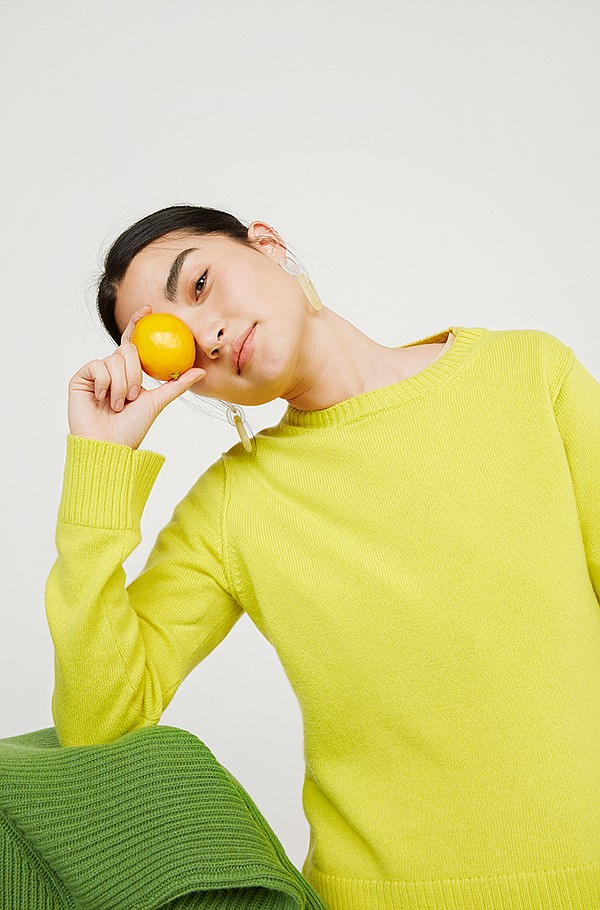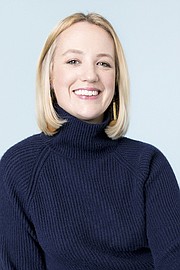RESPONSIBLE HERITAGE
The Frances Austen Brand Elevates Ecologically Sound Classics to a Heritage Level
Launched by Margaret Coblentz in 2017, the Frances Austen brand was founded in San Francisco to provide responsibly crafted, classic cashmere pieces to consumers who are concerned about how their clothing is made.
For Coblentz, spending six years at Charlotte Russe as the director of e-commerce apparel provided an extensive education in the growing business of overconsumption within the U.S. apparel market.
“There was really no conversation around the impact the business was having,” she said. “The wider conversation that we’re having now in 2019 means companies such as H&M are playing catch-up as smaller brands have led the conversation.”
With Coblentz’s growing awareness about apparel manufacturing while at Charlotte Russe, she experienced a conflict between her work at the company and her own convictions as a consumer.
“When I left Charlotte Russe, I had gotten older and our customer had stayed the same age,” she explained. “It felt like I was on this path where I learned and my career grew, but I was doing something where the more I matured the more I was at odds with my personal point of view.”
Thinking about her next steps, Coblentz examined the reasons she loved sweaters, some of which were approximately 40-year-old cashmere pieces inherited from her grandmother, Corky Mitchel.
Determined to create apparel with the longevity, natural fibers and heritage of her grandmother’s sweaters, Coblentz researched certified supply-chain partners through GOTS (Global Organic Textile Standard) and OEKO-TEX. Her newly found goal was to launch a collection of clothing without using synthetic fibers and made from natural materials. The ideal clothing would retain its integrity over generations of wearers and biodegrade if discarded.
“That is how I came to work with Johnstons of Elgin and Cariaggi,” Coblentz said as she discussed her supply-chain partners, Scottish woolen mill Johnstons of Elgin and Italian yarn spinner Cariaggi.
In addition to creating cashmere sweaters, Coblentz wanted to include silk pieces in her Frances Austen line. Using these naturally sourced materials, which could biodegrade within one to five years of being discarded—depending on the environment—Coblentz felt she could achieve her perfect blend of heritage-grade clothing that was responsibly manufactured.
After the Feb. 27 launch of her Frances Austen Collection IV for Spring 2019, Coblentz said she remains committed to improving upon the brand. While she emphasizes the quality of her former silk supply-chain partners, Coblentz wants to source a more ecological fiber and will bring production of these clothing pieces stateside.
“I am in the process of finding a higher certification of eco silk, which is really hard to do. Silk is further behind than cotton and other fabrics,” she explained. “The plan is to launch our silk L.A.–made clothing in line with our Fall collection this August. Manufacturing in Los Angeles is great, and there is a lot of capability there.”
This commitment to creating a brand that would positively affect future generations led Coblentz to ensure her packaging was made in the United States with 100 percent recycled and recyclable materials. Details, such as clothing tags cut and letterpressed in downtown Los Angeles, remain important to the Frances Austen brand.
While Coblentz intended to rely primarily on a direct-to-consumer model, she recognized the benefit of partnering with select retail partners who shared her vision.
“I built the model for how we would launch Frances Austen based on well-established metrics for e-commerce conversion,” she explained. “I discovered it’s hard for an unknown brand to gain trust and recognition from customers. A key part of doing that has been affording the opportunity to people to touch, see, feel and try on.”
At Batch, a retail showroom that opened in San Francisco in 2017 and will launch a New York City location on March 15, owner Lindsay Meyer brings together collections of 15 to 20 different online brands during eight-to-10-week cycles. She partnered with Frances Austen for a Holiday 2017 initiative and will carry the brand at the New York launch.
“Our target consumer is thinking about making investments,” Meyer said. “It’s a great customer fit with Margaret’s mission about creating these heirloom pieces that are telling a unique story, infused with a lot of authenticity in terms of where they are crafted and the intentionality she brings when thinking about the design of these pieces.”
While Coblentz describes her pricing as a “low luxury price point,” her partners, who might be a bit more conscientious regarding cost, see the value in offering Frances Austen pieces. Mariko Yamasaki, personal stylist and owner of the San Francisco boutique Pavilion, believes the Frances Austen brand creates a special connection between a mission-driven brand and the community.
“Sweaters are a notoriously difficult category to do without blowing the budget. When I saw her cashmere I thought it was absolutely phenomenal. The ethos behind it, her focus on sustainability and ethical business practices, it was really exciting and it’s in line with what we’re trying to do. It filled a category hole, but it was that perfect alliance of brand-vision goals,” she said.
Available online at www.francesausten.com and at select independent retail boutiques, Frances Austen retails from $85 to $495.























